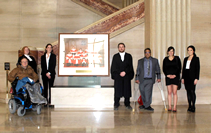Act Now

Empower U: Learn to Access Your Disability Rights Training on Canadian Human Rights, the Convention on the Rights of Persons with Disabilities (CRPD) and its Optional Protocol (OP) training aims to increase awareness of how to address discrimination using more familiar Canadian human rights laws such as Human Rights Codes and the newer international Convention on the Rights of Persons with Disabilities (CRPD). This is training for persons with disabilities by persons with disabilities. The training is part of a project funded by Employment and Social Development Canada and implemented by the Council of Canadians with Disabilities (CCD) in collaboration with Canadian Multicultural Disability Centre Inc. (CMDCI), Citizens With Disabilities – Ontario (CWDO), Manitoba League of Persons with Disabilities (MLPD) and National Educational Association of Disabled Students (NEADS). Read more.
Sign Up for our monthly digest
A monthly newsletter from CCD about what is happening in the community
Jewelles Smith Welcomed to CCD Staff
Related Documents
April 17, 2024
Council of Canadians with Disabilities : 48 years strong and "On The Road to 50 Years"
March 21, 2024
Everyone has a responsibility to end racism
December 10, 2023
International Day of Human Rights
Today, Roxana Jahani Aval, Chairperson, and Shari Hildred, National Coordinator, announced that Jewelles Smith (jewelles@ccdonline.ca) has joined the staff of the Council of Canadians with Disabilities (CCD) as the organization’s first Communications and Government Relations Coordinator. The Communications and Government Relations Coordinator is responsible for CCD’s related objectives in the general categories of monitoring, relationship management, communication and coordination.
“Ms. Smith brings to CCD a wealth of expertise on human rights, Canadian disability policy and legislation, the international United Nations human rights monitoring system and intersectionality,” stated Roxana Jahani Aval, CCD Chairperson. “In addition to her strong background in disability rights advocacy and experiential knowledge of disability, Ms. Smith is a scholar and academic researcher, who is completing her Ph.D.”
“Ms. Smith is an experienced policy analyst who employs a feminist disability and human rights lens to all her work,” stated Shari Hildred, CCD National Coordinator. “Through her academic training in Gender Studies and Critical Disability studies, her work as a researcher investigating violence against women with disabilities, mental health services and inclusive research practices, and her experiential knowledge of disability, Ms. Smith has developed in-depth expertise in a wide range of areas affecting the disability community,” continued Shari Hildred. “Ms. Smith is a trained disability human rights monitor through Disability Rights Promotion International at York University.”
Ms. Smith is a highly regarded Canadian human rights expert. The Government of Canada appointed Ms. Smith as a member of the Canadian delegation that took part in the 63rd session of the United Nations Commission on the Status of Women (UNCSW), which occurred in New York City in March 2019. The disability community included Ms. Smith in the 2017 delegation that appeared before the UN Committee on the CRPD in Geneva for the first review of Canada.
“The Accessible Canada Act is a key piece of legislation that will be bringing down barriers for Canadians with disabilities. The Act’s approach to intersectionality was influenced by interventions made by Ms. Smith with M.P.s and Senators and during Committee hearings on the Act,” stated Roxana Jahani Aval. “In the coming months, Ms. Smith will be applying her feminist disability human rights lens to current initiatives promised by the Federal Government in the Throne Speech: a Disability Inclusion Plan, focused on a guaranteed income supplement for people with disabilities, an employment strategy, and a streamlined eligibility process for Federal benefits for people with disabilities.”
“CCD’s motto is “A Voice of Our Own” and Jewelles Smith will be assisting us to amplify our voice,” stated Heather Walkus, CCD 1st Vice Chair. Ms. Smith is strong communicator who emphasizes open, respectful and democratic communication practices in all her work.”
-30-
For more information, contact:
Roxana Jahani Aval, Chairperson: rjaneads@gmail.com
Heather Walkus, 1st Vice Chair: letstalk@hooh.ca
Shari Hildred, National Coordinator: shari@ccdonline.ca
About CCD
CCD is a national human rights organization of people with disabilities working for an inclusive and accessible Canada.
Mission
The Council of Canadians with Disabilities (CCD) is a social justice organization of people with all disabilities that champions the voices of people with disabilities, advocating an inclusive and accessible Canada, where people with disabilities have full realization of their human rights, as described in the UN Convention on the Rights of Persons with Disabilities.
Mandate
The Council of Canadians with Disabilities (CCD) unites advocacy organizations of people with disabilities to defend and extend human rights for persons with disabilities through public education, advocacy, intervention in litigation, research, consultation and partnerships. CCD amplifies the expertise of our partners by acting as a convening body and consensus builder.

Some members of the CCD team at the Supreme Court of Canada on April 25, 2018 to intervene in S.A. v. Metro Vancouver Housing Corporation. (L. to R. Bob Brown, CCD Human Rights Committee member, Dianne Wintermute, legal counsel (ARCH), Dahlia James, a second year JD candidate at U. of Ottawa and Prof. Ravi Malhotra’s Research Assistant and Luke Reid, legal counsel (ARCH) , and Prof. Ravi Malhotra, a member of the Human Rights Committee, Prof. Anne Levesque, Chair of the Human Rights Committee, and Erin Carr, a second year JD candidate.
The Latimer Case
The Latimer case directly concerned the rights of persons with disabilities. Mr. Latimer's view was that a parent has the right to kill a child with a disability if that parent decides the child's quality of life no longer warrants its continuation. CCD explained to the court and to the public how that view threatens the lives of people with disabilities and is deeply offensive to fundamental constitutional values. Learn more.
